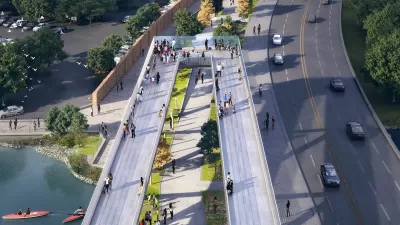The park's non-profit developer has engaged in a years-long community outreach process and invested over $60 million in community initiatives.

Community activists hope that a new Washington D.C. park, slated to open in 2023, will have positive impacts on the surrounding community and prevent the displacement that traditionally occurs around similar projects. According to Lauri Mazur in NextCity, the 11th Street Bridge Park, situated on an abandoned bridge across the Anacostia River, "will link upscale Capitol Hill with Anacostia – a historically African-American, predominantly low-income neighborhood east of the river." The park promises a slew of amenities including "playgrounds, gardens, performance spaces, an environmental education center, public art and a boat launch."
The park is a project of the non-profit Building Bridges across the River, which aims to create projects that leverage resources to support local communities and help legacy residents and businesses stay in their neighborhood. "The strategies used by Building Bridges and its partners – engaging the community, building trust, backstopping existing residents and businesses – offer a model for the Biden administration and others working to rebuild from the wreckage of the last year."
Although many residents were at first wary of the $30 million project, the organization's comprehensive outreach strategy sought to get meaningful feedback from local stakeholders and address concerns about displacement and gentrification. The 11th Street Bridge Park project centers equitable development in its plans, having invested more than $60 million in community development efforts so far. It helped launch the Douglass Community Land Trust, which maintains 200 affordable properties, and collaborated with another non-profit to start a "home-buyers' club" to help prospective buyers "navigate the complexity of purchasing a home."
Building Bridges Across the River acknowledges that neighborhood change is inevitable. "Inevitably, the bridge park will bring new visitors and resources to the neighborhoods east of the river. Building Bridges Across the River and its partners are working to position existing residents and businesses to benefit from that influx of investment — and avoid getting pushed out."
FULL STORY: Can a Park Prevent Gentrification?

Planetizen Federal Action Tracker
A weekly monitor of how Trump’s orders and actions are impacting planners and planning in America.

Congressman Proposes Bill to Rename DC Metro “Trump Train”
The Make Autorail Great Again Act would withhold federal funding to the system until the Washington Metropolitan Area Transit Authority (WMATA), rebrands as the Washington Metropolitan Authority for Greater Access (WMAGA).

DARTSpace Platform Streamlines Dallas TOD Application Process
The Dallas transit agency hopes a shorter permitting timeline will boost transit-oriented development around rail stations.

Renters Now Outnumber Homeowners in Over 200 US Suburbs
High housing costs in city centers and the new-found flexibility offered by remote work are pushing more renters to suburban areas.

The Tiny, Adorable $7,000 Car Turning Japan Onto EVs
The single seat Mibot charges from a regular plug as quickly as an iPad, and is about half the price of an average EV.

Supreme Court Ruling in Pipeline Case Guts Federal Environmental Law
The decision limits the scope of a federal law that mandates extensive environmental impact reviews of energy, infrastructure, and transportation projects.
Urban Design for Planners 1: Software Tools
This six-course series explores essential urban design concepts using open source software and equips planners with the tools they need to participate fully in the urban design process.
Planning for Universal Design
Learn the tools for implementing Universal Design in planning regulations.
Municipality of Princeton
Roanoke Valley-Alleghany Regional Commission
City of Mt Shasta
City of Camden Redevelopment Agency
City of Astoria
Transportation Research & Education Center (TREC) at Portland State University
US High Speed Rail Association
City of Camden Redevelopment Agency
Municipality of Princeton (NJ)



























